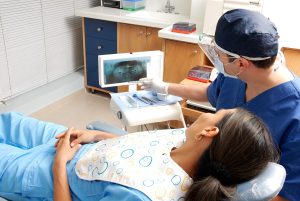Introduction
The dental profession has been using dental Implants for decades, but in recent years the public has became aware of the advantages of replacing missing teeth with implants. Many dental patients choose dental implants because they can offer a very conservative course of treatment with predictable results.
How do you know if dental implants are right for you?
Like in everything that we do there are steps to follow:
Make an initial consultation with your dentist:
- Your dentist will do an initial oral evaluation and review of your medical condition. This is so important because in some few cases systemic or chronic health issues may prevent you from getting dental implants until those health issues are resolve.
- Your dentist will take models of your jaws/teeth, necessary X-rays, and in most cases a cone bean ct scan to determine bone quality, width and height of available bone where the proposed implant(s) would be placed, as well as to determine proximity to vital structures.
Gathering all the information and preparing the treatment plan
- Your dentist will give you all the treatment options for your specific needs, and will answer all your questions accordingly.
- In some cases a special clearance from your physician may be required.
- You will get an inform consent to allow your dentist perform the treatment of choice.

Dentist explains treatment options for dental implants to patient
Your finances
- Depending on your needs the expenses of replacing your missing teeth with implants, could go from a couple of thousands to several thousand dollars, however the good news is that most dental offices have affordable payment plans thru Care credit or other institutions. In some cases dental insurance can help cover the cost.
The appointment to get your dental implants
- On that day you will get your implants placed where planned. Most people experience just a mild discomfort after the procedure, however anti-inflammatory medication is recommended such advil or ibuprophen.
- Depending on your case you may get a healing abutment on top of the implant or a temporary tooth on your implant.
- You will wait four months for the final restoration (crown, bridge, hybrid bridge or overdenture)

![Types of Dental Implants[In depth guide]](https://dentistacoralsprings.com/wp-content/uploads/2019/04/woman-front-r-300x200.jpg)
